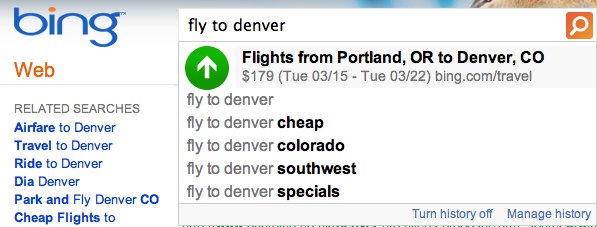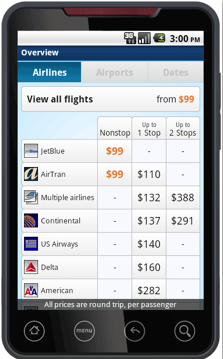Bing Partners with Travel Search Site Kayak
 Microsoft has today announced that its Bing search engine has added a new partner, the popular travel search site Kayak. Going forward, Kayak will provide its flight search and pricing data to Microsoft which will be then integrated into Bing’s search results. What that means for Bing users is that they will now have access to flight search data for more cities, more airports and more airlines, in more locations around the world thanks to Kayak, says Microsoft.
Microsoft has today announced that its Bing search engine has added a new partner, the popular travel search site Kayak. Going forward, Kayak will provide its flight search and pricing data to Microsoft which will be then integrated into Bing’s search results. What that means for Bing users is that they will now have access to flight search data for more cities, more airports and more airlines, in more locations around the world thanks to Kayak, says Microsoft.
This is the second travel-focused update to Bing in less than two weeks, and is notable in light of Google’s attempted acquisition of ITA Software, the system powering travel pricing for dozens of airlines and flight tracking sites. If that deal went through, it would strike a direct blow to Microsoft’s attempt to innovate within the travel search vertical.
On Kayak’s side, this latest Bing partnership may impact the mapping system Kayak uses on its own website, it appears. From the company press release, Kayak says it was “already evaluating” replacing its current mapping system with Bing Maps. That’s now looking a lot more likely.
Improvements to Bing Travel Searches
Last week, Bing introduced a small update that offered airfare information to users who type the phrase “fly to…” followed by a city name into the Bing search box. This now displays the lowest priced ticket to that destination and the dates when that ticket is available in the drop-down box that appears.
The feature is powered by the airfare prediction technology from Farecast, a company Microsoft acquired back in 2008. Farecast will continue to offer airfare suggestions like this, even after the Kayak integrations are complete.

Kayak is only one of Bing’s many partnerships to enhance search results with third-party information. Currently, Bing also integrates data from Facebook, Twitter and Wolfram Alpha into its search results. It also recently introduced a feature that offers small “live tiles” to the right of its search results that pull metadata from dozens of partner websites including IMDb, Yahoo Movies, Rotten Tomatoes, OpenTable, Yelp, CitySearch, Urban Spoon, Cheap Flights, YouTube, MTV, Last.fm, Rhapsody, Pandora, MSN and others. These tiles display snippets of information you can read at a glance, without needing to click through on search results. Yesterday, it also added data from deal and coupon tracking site The Dealmap to Bing search results.
Bing, Kayak and Others Position Themselves Against Google
The partnership announcement is also notable as another move that will impact the controversial acquisition attempt by Google to acquire flight data provider ITA Software. ITA provides pricing for around 30 airlines and online travel sites, including Kayak, as well as Orbitz, TripAdvisor, Southwest Airlines, Continental Airlines, United Airlines, US Airways, Virgin Atlantic Airways and others. ITA also provides data to Bing. Because Kayak and Bing source their flight data from ITA, it’s unclear why Kayak brings more data to Bing than it had previously. We’ve reached out to Microsoft for clarification on that point.
Update: A Microsoft spokesperson attempts to explain this like so:
Yes, both Kayak and Bing rely on ITA for key travel search features, and both will continue to do so. The objective of this partnership with Kayak is to complement ITA’s technology. The incorporation of Kayak’s comprehensive search results into Bing Travel helps increase the number of available airlines, airports and cities available to searchers.
Yes, we’re still confused, too. We’ll attempt to get more specifics on this point.
A number of travel sites, including Kayak, Travelocity, Hotwire, Expedia and TripAdvisor, normally in direct competition with each other, have teamed up in a coalition called Fairsearch to fight the proposed Google-ITA acquisition. Seeing Kayak partner with Bing is yet another important move that will impact whether or not that deal becomes a reality.

 In July, Google announced its
In July, Google announced its